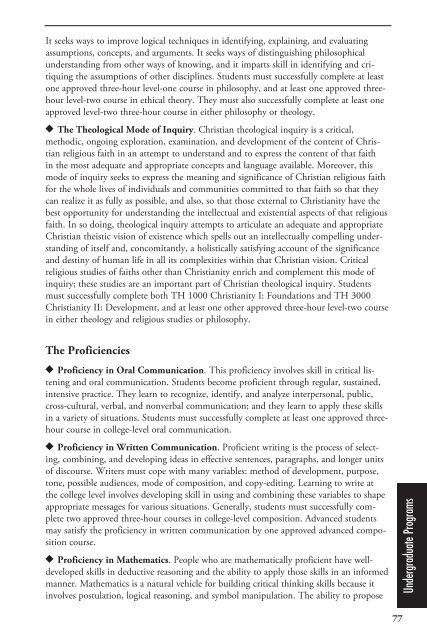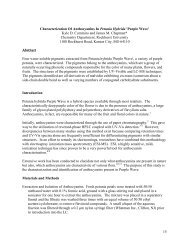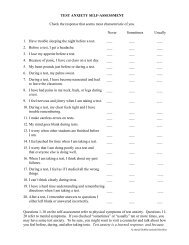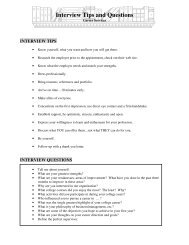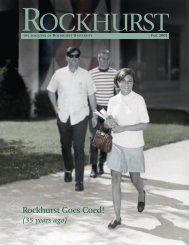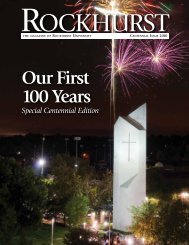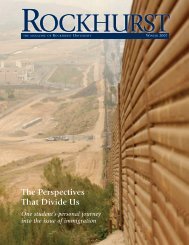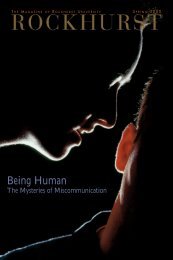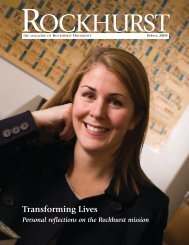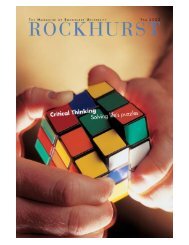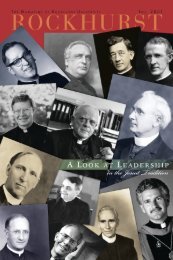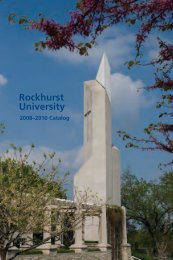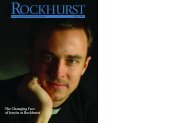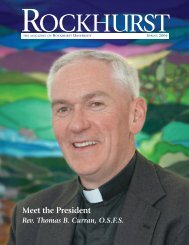- Page 1:
Rockhurst University2012-2014 Catal
- Page 5 and 6:
Special Undergraduate Academic and
- Page 7:
Accreditation and AffiliationsRockh
- Page 10:
Living Our Tradition Today: We are
- Page 13 and 14:
Core Values• Promoting analytical
- Page 15 and 16:
Evening ProgramsThrough the School
- Page 17 and 18:
Undergraduate StudiesThis section p
- Page 19 and 20:
Admission with a GED (General Educa
- Page 21 and 22:
2. English translations of final of
- Page 23 and 24:
Undergraduate Tuitionand FeesFor sp
- Page 25 and 26:
Alumni Discount ProgramIn an effort
- Page 27 and 28: Return of Federal FundsThe return o
- Page 29 and 30: Undergraduate Financial AidPrograms
- Page 31 and 32: Coordination of Financial AidAny fi
- Page 33 and 34: ing federal regulations and institu
- Page 35 and 36: Right to AppealAll students have th
- Page 37 and 38: Employment OpportunitiesCareer Serv
- Page 39 and 40: Meeting with their assigned academi
- Page 41 and 42: numbers are given here. Some specif
- Page 43 and 44: of college credit and a score of 3
- Page 45: NPIXWWFAUNot Passing. This grade wi
- Page 48 and 49: 46The Robin Bowen Leadership Award.
- Page 50 and 51: 48The Barbara Wynne Outstanding Bio
- Page 52 and 53: professional, and personal growth.
- Page 54 and 55: 52Requirements for Earning a Second
- Page 56 and 57: Faculty should clearly communicate
- Page 58 and 59: 56III. Nurturing Academic HonestyFa
- Page 60 and 61: within ten working days of timely r
- Page 62 and 63: 602. If within 14 days of the instr
- Page 64 and 65: 62AuditThose students taking course
- Page 66 and 67: AppealIf a student fails to notify
- Page 68 and 69: 66directly through assessment of st
- Page 70 and 71: Confidential letters and statements
- Page 72 and 73: 19. The University may disclose to
- Page 74 and 75: 72in requesting or obtaining the in
- Page 76: 74University Communication with Stu
- Page 81 and 82: Philosophical ModeTheological ModeP
- Page 83 and 84: Students who plan to begin their ca
- Page 85 and 86: AR 1250. Three Dimensional Studio:S
- Page 87 and 88: Major Field of ConcentrationA major
- Page 89 and 90: Cell and Molecular Biology Track Re
- Page 91 and 92: plan. The integumentary, skeletal,
- Page 93 and 94: BL 3900. Biology Field Trip (2)An o
- Page 95 and 96: Catholic Studies (CA)Program Direct
- Page 97 and 98: The Chemistry Department offers the
- Page 99 and 100: CH 3320. Biochemistry Laboratory (1
- Page 101 and 102: At Rockhurst, the aim of the langua
- Page 103 and 104: FR 1150. Fundamentals of French II
- Page 105 and 106: GR 1000. Beginning Conversational G
- Page 107 and 108: A bilingual emphasis is available f
- Page 109 and 110: works by Novarro, Echeverría, Bemb
- Page 111 and 112: Department of Communicationand Fine
- Page 113 and 114: service, as well as graduate study.
- Page 115 and 116: ing, intrapersonal, interpersonal c
- Page 117 and 118: up for the course. Students can ear
- Page 119 and 120: Department of English (EN)Professor
- Page 121 and 122: Students will receive a certificate
- Page 123 and 124: Tales. To gain greater insight into
- Page 125 and 126: EN 3890. Women and Literature (3)Th
- Page 127 and 128:
to heighten the tone and meaning of
- Page 129 and 130:
Elective Course GroupingsCultureA m
- Page 131 and 132:
and HS 2500 are also required. Also
- Page 133 and 134:
HS 3440. Modern France (3)A survey
- Page 135 and 136:
and neo-colonialism; the motivation
- Page 137 and 138:
JN 3030. Feature Writing (3)Study o
- Page 139 and 140:
MT 1090. Calculus for Business (3)A
- Page 141 and 142:
Music (MS)(Department of Communicat
- Page 143 and 144:
concentrates on non-harmonic tones
- Page 145:
Department of Philosophy (PL)Profes
- Page 148 and 149:
losophers such as Heidegger, Schele
- Page 150 and 151:
148PL 4400-4490. Seminar: Major Phi
- Page 152 and 153:
PH Required:PH 3200 Physics of the
- Page 154 and 155:
152ing of covered physics principle
- Page 156 and 157:
PH 4900. Statistics for the Health
- Page 158 and 159:
PS 3710. Legal Process and Systems
- Page 160 and 161:
Group B: Biological/ExperimentalPsy
- Page 162 and 163:
160PY 3430 Cross Cultural Perspecti
- Page 164 and 165:
current topics, controversies, and
- Page 166 and 167:
Theatre Arts (TA)(Department of Com
- Page 168 and 169:
credit. Prerequisite: instructor ap
- Page 170 and 171:
168ormation (500-1500 CE). Students
- Page 172 and 173:
170Americans, Mormonism, African-Am
- Page 174 and 175:
Pre-Medical Post-BaccalaureateCerti
- Page 176 and 177:
School of Graduate &Professional St
- Page 178 and 179:
Department of CommunicationSciences
- Page 180 and 181:
Additional Coursework to meet ASHA
- Page 182 and 183:
Basic Proficiencies:English Composi
- Page 184 and 185:
Criminal Justice (CJ)Program Direct
- Page 186 and 187:
CJ 3000. Law Enforcement and Polici
- Page 188 and 189:
Elementary EducationThe Bachelor of
- Page 190 and 191:
Also, secondary education students
- Page 192 and 193:
Graduation Requirements:1. Achieve
- Page 194 and 195:
ED 4020 (ED 6020). Fundamentals ofL
- Page 196 and 197:
ED 4770 (ED 6770). The Middle Schoo
- Page 198 and 199:
Major CoursesEXS 3300 Kinesiologica
- Page 200 and 201:
198EXS 3801. Foundations of Conditi
- Page 202 and 203:
As such, emphasis is placed upon th
- Page 204 and 205:
Nonprofit Leadership Studies (NP)Pr
- Page 206 and 207:
Fundraising Leadership CertificateS
- Page 208 and 209:
financial information in the manage
- Page 210 and 211:
Course DescriptionsPA 2000. Legal T
- Page 212 and 213:
Certificate ProgramsThe following c
- Page 214 and 215:
Program OverviewSince 1933, Rockhur
- Page 216 and 217:
AdmissionUndergraduate students are
- Page 218 and 219:
Concentration Requirement for the B
- Page 220 and 221:
218Concentration in Management (15
- Page 222 and 223:
Students should select two elective
- Page 224 and 225:
Law and Economics Track Requirement
- Page 226 and 227:
AC 3500. Accounting Information and
- Page 228 and 229:
EconomicsEC 1000. Principles of Mac
- Page 230 and 231:
EC 4940. Global Economic Issues (3)
- Page 232 and 233:
ary materials to expand beyond the
- Page 234 and 235:
nursing or an associate degree in n
- Page 236 and 237:
C. All students placed on the waiti
- Page 238 and 239:
Course DescriptionsThe following se
- Page 240 and 241:
238NU 4210/4211. Community Health N
- Page 242 and 243:
Regina Fields (2007)Assistant Profe
- Page 244 and 245:
Special Undergraduate Academicand C
- Page 246 and 247:
244FIP students plan their programs
- Page 248 and 249:
Medical Scholars Program—Universi
- Page 250 and 251:
The Pre-Veterinary Medicine Program
- Page 252 and 253:
SA 2000. Cultural Transitions and A
- Page 254 and 255:
encounter the religious diversity o
- Page 256 and 257:
254sors seek to help students under
- Page 258 and 259:
The Student Life program complement
- Page 260 and 261:
The Safety and Security Department
- Page 262 and 263:
Students are responsible for mainta
- Page 264 and 265:
account delinquency. Students who q
- Page 266 and 267:
tor and the School of Graduate and
- Page 268 and 269:
266Graduate Financial AidPrograms a
- Page 270 and 271:
268they do not intend to file the F
- Page 272 and 273:
The measure of instructional contac
- Page 274 and 275:
Course PoliciesCourse Numbering Sys
- Page 276 and 277:
Office at Rockhurst University so t
- Page 278 and 279:
CertificatesCredit-Bearing Certific
- Page 280 and 281:
278E. Unauthorized use of Universit
- Page 282 and 283:
6. The Academic Disciplinary Board
- Page 284 and 285:
*Note: The term “semester” is u
- Page 286 and 287:
284Registration and Graduation Hold
- Page 288 and 289:
of the dean will also be considered
- Page 290 and 291:
288evaluation, transcripts, admissi
- Page 292 and 293:
8. Education records may be disclos
- Page 294 and 295:
The University will provide public
- Page 296 and 297:
Complaints of Alleged Violation of
- Page 298 and 299:
School of Graduate &Professional St
- Page 300 and 301:
Demonstrate knowledge of basic huma
- Page 302 and 303:
The program has been structured so
- Page 304 and 305:
302Language Development (CD 2605)An
- Page 306 and 307:
CD 6128. Language Disorders in Scho
- Page 308 and 309:
as service learning projects, immer
- Page 310 and 311:
*Co-listed as a 4000-level undergra
- Page 312 and 313:
ED 6700 Diagnosing and Instructing
- Page 314 and 315:
Other Professional Semester Require
- Page 316 and 317:
might be of assistance in meeting t
- Page 318 and 319:
316assistive/augmentative technolog
- Page 320 and 321:
Department ofOccupational Therapy (
- Page 322 and 323:
Post-Baccalaureate StudentsStudents
- Page 324 and 325:
GraduationThe Master of Occupationa
- Page 326 and 327:
Course DescriptionsOT 5110. Medical
- Page 328 and 329:
OT 5710. Research III: Proposal Dev
- Page 330 and 331:
Department of Physical Therapy (PT)
- Page 332 and 333:
330Requirements for AdmissionApplic
- Page 334 and 335:
PT 6126 Movement Science I Lab .5PT
- Page 336 and 337:
334Course DescriptionsPT 6001. Phys
- Page 338 and 339:
fessional development. The focus of
- Page 340 and 341:
explored in light of evidence-based
- Page 342 and 343:
lenge their status as part of the p
- Page 344 and 345:
team-based activities. Courses blen
- Page 346 and 347:
August, and October. At one course
- Page 348 and 349:
MBA AdmissionAnyone holding a bache
- Page 350 and 351:
MBA in Health Care LeadershipOffere
- Page 352 and 353:
graduate-level course requires inde
- Page 354 and 355:
EconomicsEC 6000. Managerial Econom
- Page 356 and 357:
insights and behavioral skills need
- Page 358 and 359:
Management Information SystemsMIS 5
- Page 360 and 361:
Board of TrusteesAs of July 1, 2011
- Page 362 and 363:
Full Time FacultyAs of August 2012S
- Page 364 and 365:
Myles P. Gartland IIAssociate Profe
- Page 366 and 367:
Nicole Gandy MoodieAssistant Profes
- Page 368 and 369:
Risa J. SteinProfessor of Psycholog
- Page 370 and 371:
368Helen EmmottLecturer in Theology
- Page 372 and 373:
Advanced College Credit ProgramMich
- Page 374 and 375:
Jane RuesProfessor of Occupational
- Page 376 and 377:
u Student Activities Hall (2000). S
- Page 378 and 379:
The Department of Mathematics and P
- Page 380 and 381:
Rockhurst TraditionsHistorical High
- Page 382 and 383:
1996Rockhurst completed the “Rene
- Page 384 and 385:
u The Visiting Scholar Lecture Seri
- Page 386 and 387:
1993-1994Rev. Robert Barth, S.J.Rev
- Page 388 and 389:
386• The George B. Byrnes Scholar
- Page 390 and 391:
• The R. McRae “Mac” Geschwin
- Page 392 and 393:
Francis J. Carey, S.J., and honorin
- Page 394 and 395:
• The Laurence R. O’Donnell Mem
- Page 396 and 397:
• The Ted Tobin Scholarship, crea
- Page 398 and 399:
• The Robert A. Long Sponsored Sc
- Page 400 and 401:
398• Greenlease Library Fund, to
- Page 402 and 403:
Alumni AssociationThe Rockhurst Uni
- Page 404 and 405:
Honorary DegreesYear Degree Recipie
- Page 406 and 407:
Faculty and Staff RecognitionDaniel
- Page 408 and 409:
Excellence in Teaching Award fromMi
- Page 410 and 411:
Director of Human ResourcesDeputy T
- Page 412 and 413:
410faculty, staff or other person s
- Page 414 and 415:
ammunition, explosives/incendiary d
- Page 416 and 417:
Appeals, grade.....................
- Page 418 and 419:
Evening Programs, program offerings
- Page 420 and 421:
418Jesuit Residence................
- Page 422 and 423:
420Renewal and adjustment of financ
- Page 425:
www.rockhurst.edu


